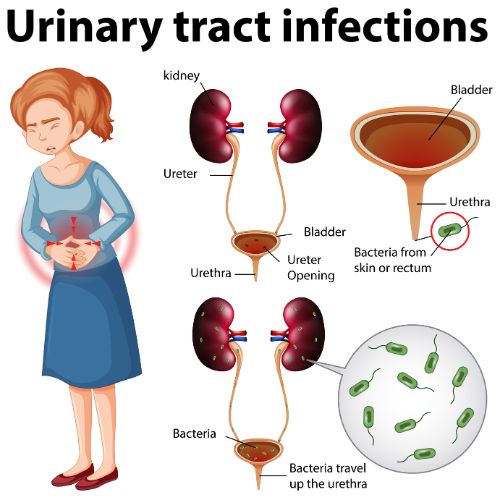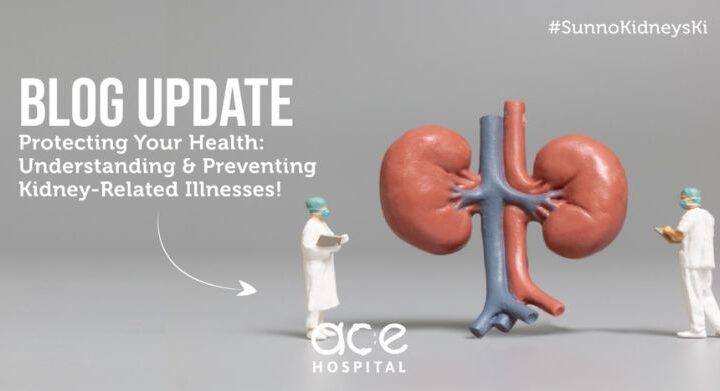Urinary Tract Infection Treatment in Pune
A urinary tract infection (UTI) is an infection that affects any part of the urinary system, including the bladder, kidneys, ureters, and urethra. It is typically caused by bacteria and is more common in women than men.
Types of urinary tract infections :
Each type of UTI infection may result in more-specific symptoms. The symptoms depend on which part of the urinary tract is affected. The choice of medication and duration of treatment depend on your health status and the specific bacteria detected in your urine.
Most Common Urine Infection Symptoms :
- Strong urge to urinate that doesn’t go away
- Burning feeling when urinating
- Urinating often, and passing small amounts of urine
- Strong-smelling urine


Male urinary tract system
The male urinary system consists of the kidneys, ureters, bladder, and urethra. The kidneys filter waste from the blood to produce urine, which travels through the ureters to the bladder, where it is stored until urination. In males, the longer urethra also runs through the prostate gland and serves dual functions in urination and ejaculation. Regular health check-ups are vital for maintaining the system’s health.

Female urinary tract system
The female urinary system consists of the kidneys, ureters, bladder, and urethra. The kidneys filter waste from the blood, creating urine that travels through the ureters to the bladder, which stores urine until it is expelled via the urethra. The shorter urethra in females increases susceptibility to urinary tract infections, highlighting the importance of regular health check-ups for maintaining urinary health.
Placement of infection : Arranged from most common to severe type of infection

Symptomatic Bacteriuria : In some cases, bacteria may be present in the urine without causing any symptoms typically does not require treatment unless the individual is pregnant or undergoing certain medical procedures.
Kidneys (Pyelonephritis)
This type of UTI is more severe and involves an infection of the kidneys.
- Back or side pain
- High fever
- Shaking and chills
- Nausea
- Vomiting
Bladder (Cystitis)
- Pelvic pressure
- Lower belly discomfort
- Frequent, painful urination
- Blood in urine
Urethra (Urethritis)
- Pain or burning sensation during urination
- Increased frequency of urination
- Urgency to urinate
- Discharge from the urethra (may be clear, white, or yellow)
- Blood in the urine
Complications
Treatments
UTI treatments typically involves antibiotics, and the specific antibiotic prescribed depends on the type and severity of the urine infection. The choice of medication and duration of treatment depend on your health status and the specific bacteria detected in your urine
Common UTI’s
- A short course of antibiotics, usually lasting three to seven days, is often effective
- Vaginal estrogen therapy for post-menopause UTIs
Severe UTI’s
- Such as pyelonephritis or complicated UTIs (involving factors such as structural abnormalities or catheter use), a longer course of antibiotics may be necessary
- Often involves hospitalization and intravenous (IV) antibiotics

Causes
UTIs typically occur when bacteria, especially Escherichia coli (E. coli) from the colon, enter the urinary tract through the urethra. UTIs are most frequently observed in women due to shorter urethra and close proximity to the anus. UTI commonly affects the bladder and urethra
Risk factors that may lead to UTI:
Poor Hygiene
Inadequate personal hygiene, such as improper wiping from back to front after using the toilet, can lead to the spread of bacteria from the anal region to the urethra and then to the bladder, increasing the risk of infection
Suppressed Immune System
Conditions or medications that weaken the immune system, such as diabetes, HIV/AIDS, chemotherapy, or long-term use of corticosteroids, can make individuals more susceptible to UTIs
Sexual Activity
Sexual intercourse can introduce bacteria into the urinary tract, increasing the likelihood of bladder infections, particularly in women
Suppressed Immune System
Conditions or medications that weaken the immune system, such as diabetes, HIV/AIDS, chemotherapy, or long-term use of corticosteroids, can make individuals more susceptible to UTIs

Use of contraceptive methods
Certain contraceptive methods, such as spermicides or diaphragms, can increase the risk of UTIs in some individuals
Genetic Predisposition
Some individuals may have a genetic predisposition to UTIs due to factors such as variations in immune system function or urinary tract structure
Dehydration
Insufficient fluid intake can lead to concentrated urine, which may promote bacterial growth and increase the risk of UTIs
Obstructions
Any blockages or obstructions in the urinary tract, such as from kidney stones or tumours, can impede the flow of urine and increase the risk of UTIs
Urinary Catheterization
People who have urinary catheters inserted for medical reasons, such as urinary retention or surgery, are at an increased risk of developing UTIs due to the introduction of bacteria into the urinary tract
Diagnosis

Medical History Review
A healthcare provider will ask about urinary symptoms, medical history, and other relevant factors to assess for a UTI

Physical Examination
If you experience frequent UTIs, your healthcare provider might recommend a cystoscopy as part of your evaluation Your healthcare provider might advice an ultrasound, CT scan, or MRI to assess for any structural abnormalities in the urinary tract

Urinalysis
A urine sample is analysed via urinalysis to detect signs of infection and a urine culture identifies the bacteria type and suitable antibiotics

Additional Tests
In some cases, additional diagnostic tests may be ordered, especially if the UTI is recurrent or complicated. May include kidney ultrasound or CT scan to evaluate the urinary tract for any structural abnormalities or complications

Pregnancy
Pregnant women may undergo regular urine testing throughout pregnancy to screen for asymptomatic bacteriuria, which, if left untreated, can increase the risk of complications
Can UTIs be prevented?







